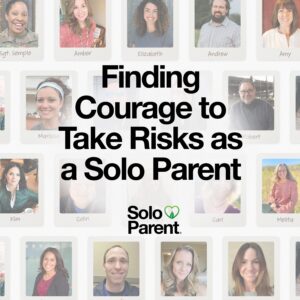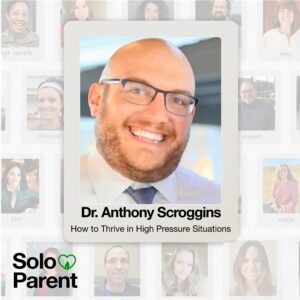There’s a particular kind of exhaustion that comes from always wondering how others see you. As a single parent, that question doesn’t just surface at work or in passing interactions. It shows up in your most vulnerable moments, when you walk into church with your kids, when you’re late to a school event, when you parent differently than others expect.
You might feel the weight of every stare, every silence, every moment someone didn’t include you. But here’s the truth: not all judgment is real. Some of it’s imagined. And some of it? It’s yours.
In this episode, author and single parent Marissa Lee joins us to unpack the layers of judgment that solo parents carry. We talk about the difference between being judged and feeling judged, and why the most painful criticism often doesn’t come from others…it comes from within.
Key Insights from This Episode
- Sometimes, the judgment you feel is a reflection of your own fear, not someone else’s opinion.
- We default to negative assumptions because we’ve been hurt. But we can train our brains to consider other narratives, ones rooted in reality, not fear.
- You don’t owe anyone an explanation for your life. Anchor yourself in what’s true, and release the voices that were never yours to begin with.
This matters because the judgment we carry can keep us isolated, defensive, and ashamed. And if we can’t tell the difference between real rejection and our own internal critic, we end up staying stuck, even when no one else is holding us back.
One of the most disorienting things about judgment is that it doesn’t have to be real to be powerful. As Marissa shared, “It doesn’t matter if it’s real or not. The way I interpret it has just as much impact.”
Whether you’ve felt left out at a party or walked into a room where no one looked up, your body reacts the same way. You shrink. You replay it. You wonder what you did wrong. And often, you turn that moment into a story that follows you for years.
Elizabeth shared a moment like that, a time when she walked into a friend’s house and wasn’t greeted warmly. She spiraled into self-doubt, only to find out the next morning that her friend had simply been overwhelmed. “I stayed up that night wondering if I’d done something. But it wasn’t about me at all.” That moment was a reminder: just because something feels personal doesn’t mean it is.
Sometimes, the judgment you feel is a reflection of your own fear, not someone else’s opinion.
When we’re vulnerable, emotionally raw, overstimulated, tired, we’re more likely to believe the worst about ourselves. That’s when old messages bubble up: you’re not enough, you messed that up, they’re all thinking it too.
Robert reminded us that single parents often walk around in their heads, internalizing imagined criticism before anyone’s said a word. One of the most helpful tools? Write it down. Ask yourself, What’s the story I’m telling myself right now? Is it true? Do I know that person thinks that, or am I afraid they do?
Marissa offered another tool: the “or maybe” exercise. If your mind immediately assumes the worst, try imagining something else. She didn’t respond to my text… or maybe she was busy. He looked frustrated when I walked in… or maybe his dog chewed up his couch.
We default to negative assumptions because we’ve been hurt. But we can train our brains to consider other narratives, ones rooted in reality, not fear.
Sometimes, no one else is judging you. You’re doing it all on your own. Elizabeth shared a story that had haunted her for years, a stranger on the beach shaking her head in disapproval while she struggled through a parenting moment. But what hurt the most wasn’t the look from the stranger. It was her own shame.
“I hadn’t dealt with how I felt about that moment as a mom. I was more upset with myself than with her.” That realization matters, because internal judgment is often a clue that there’s a deeper wound we haven’t yet healed.
Robert offered three simple but powerful questions for solo parents stuck in self-judgment:
- Would I say this to a friend in my shoes?
- Where did I learn that being a single parent is less than?
- Whose voice is echoing in my head right now?
It might be a parent. An ex. A church leader. Or the legal system that put your life on trial. But if it’s not your voice, you don’t have to keep listening.
You don’t owe anyone an explanation for your life. Anchor yourself in what’s true, and release the voices that were never yours to begin with.
Listener Question:
“How do you handle feeling left out around couple friends?”
This week’s listener wrote in asking how to deal with being around married couples as a solo parent. It’s a familiar ache, especially around the holidays or social events when everyone seems to be paired off.
Elizabeth named the subtle pain of being the only one without someone to lean over to and whisper a joke. Robert reflected on how his neighborhood friend group shifted post-divorce. “People didn’t know how to handle it. I just tried not to take it personally. They weren’t picking sides. They were just unsure.”
Marissa reminded us that sometimes, we’re not actually missing out—we’re just living differently. “Even now that I’m remarried, I still spend time with friends one-on-one. That’s how I built my life, and it still works. Community doesn’t have to look like everyone else’s version of belonging.”
Stay Connected + Get Support
We want to answer any Solo Parent questions you may have. Submit your listener questions HERE.
Additional Resources:




